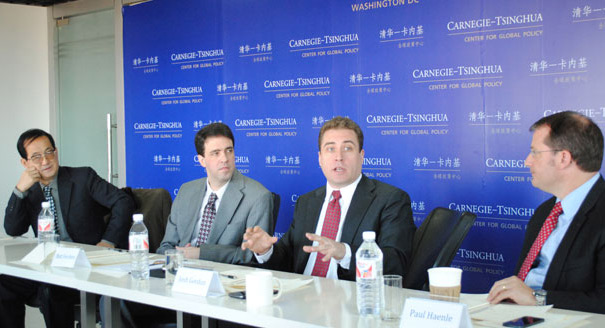Registration
You will receive an email confirming your registration.
U.S. President Barack Obama’s historic visit to Myanmar in November 2012 marked a turning point in relations between the countries, as Myanmar’s economic and political reforms seemed to shift its position away from being seen as a Chinese ‘satellite state’ to a tentative ally of the United States. The dramatic internal changes in Myanmar have refocused attention on the dynamics between the United States and China, playing into issues of trust and mistrust among the three countries.
Carnegie-Tsinghua’s Matt Ferchen hosted a roundtable discussion with Josh Gordon, PhD candidate at Yale University, Carnegie’s Paul Haenle, and Ma Jiali from the China reform forum to discuss how the public in Myanmar views these monumental changes.
Myanmar’s National Narrative: The Golden Land
- A Country’s Internal Stories: Gordon pointed out that many analysts of Myanmar’s foreign relations have overlooked a key factor in understanding the apparent shift away from China and toward the United States. This factor is the country’s own view of its history and relations with external powers. These ‘national narratives,’ he said, could answer persistent questions such as why issues of territoriality and sovereignty are so sensitive to China, or why the United States takes such a strong stand on advocating the correctness of a certain form of government. But these narratives, he cautioned, should not be taken as factual representation. They frequently involve erasure and embellishment, and are more like a governing ideology or a framework for thought.
- The Dream of the Golden Land: Myanmar’s national narrative, Gordon said, is centered around its view of itself as the “golden land,” a combination of natural bounty and desirable location that draws both “covetous outsiders” and “treacherous insiders.” This has led to two competing variants of the national narrative—one promoted by the ruling junta that Aung San Suu Kyi and the National League for Democracy (NLD) would sell the country to a “neocolonial West” and the other, promoted by the NLD, that the junta was selling the country to the Chinese. Haenle agreed, adding that the people of Myanmar were looking for a way to avoid over reliance on either the United States or China.
- The Origins of Myanmar’s Narrative: Gordon outlined the origins of Myanmar’s narrative by delineating three distinct eras in the country’s recent history. The first was the colonial era, he said, which laid the foundations for commercialization and immigration, while the people of Myanmar themselves felt excluded and marginalized from this newfound wealth. This led into the parliamentary period, where a form of “quirky” socialism attempted to take back control of the economy for the people. Then, under the junta, there was both a rejection of socialism and a boycott of the West, leading to China’s rise in influence and the era of the “Lawpan Khit” or “Chinese boss.” Anti-Chinese sentiment, Gordon concluded, became pervasive and connected with many domestic issues such as investment, immigration, and border trade.
Myanmar’s Development and Future Challenges
- The West’s Shifting Frame: While things look good at the moment, Gordon cautioned that there is potential for an anti-Western backlash, precisely because of the nature of Myanmar’s national narrative. The West, he warned, risks fitting itself into the “golden land” narrative as the outsider seeking to take advantage of Myanmar’s bounty. The expectations that Aung San Suu Kyi, an almost saintly figure, would fix everything, should be tempered, he added. Expectations of what the reforms will bring are unrealistic, and the “black and white” nature of local politics would turn grey, he concluded.
- Rebalancing Trust and New Narratives: Rebalancing trust among the three countries and fixing Myanmar’s infrastructure and human capital deficit might require tweaks to Myanmar’s existing national narrative, the difficulties with which have been brought into sharp focus by the Rohingya issue, Gordon said. As a recommendation, he proposed the possibility of Myanmar allowing for “broad-based inclusive development.” Ma added that Myanmar and India could both benefit from modifying India’s “Look East” policy to a conception of an “Inter-East.” Haenle noted that the region’s persistent drug trafficking and public health issues created opportunities for Myanmar to take leadership in tripartite cooperation.
